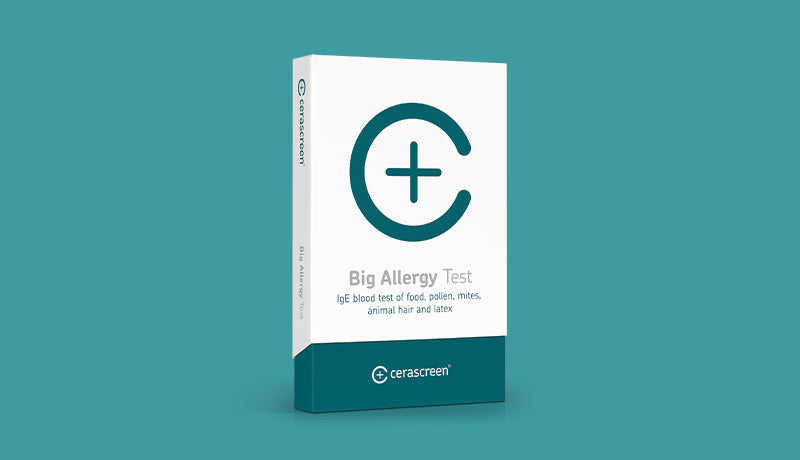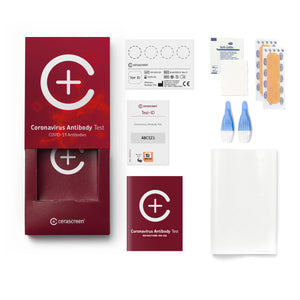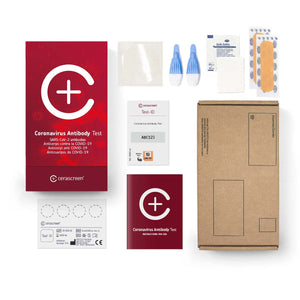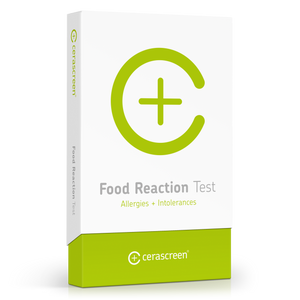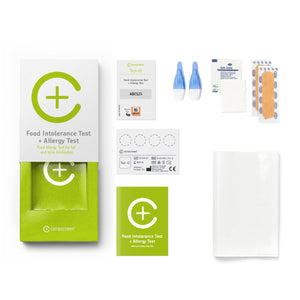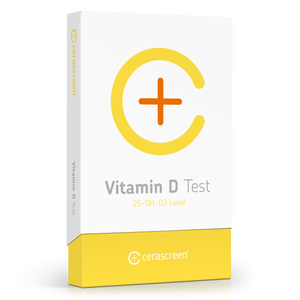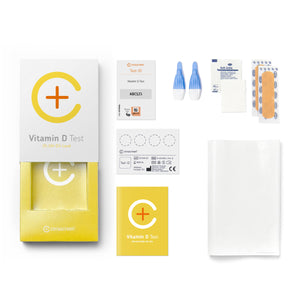product_id = 5085247602747variant_id = 34364575907899template_name =
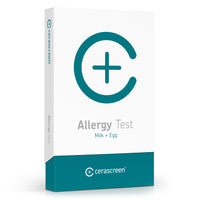
Dairy + Egg Allergy Test
About the test
Allergies to cow’s milk and chicken eggs are among the most common food allergies. The symptoms range from a burning sensation in the mouth to respiratory and gastrointestinal complaints to skin irritations.
With the cerascreen® Milk + Egg Allergy Test, you can determine the number of specific IgE antibodies for cow's milk and chicken eggs in your blood. This will tell you whether you have become sensitised to cow's milk or chicken eggs and are therefore possibly allergic.
Dairy + Egg Allergy Test
- Take your sample at home, with just one finger prick
- Receive a professional analysis from a medical laboratory
- Get a comprehensive results report
- Receive concrete recommendations on steps to take
- Receive your results within a few days after the sample’s arrival in the laboratory
Benefits of the Dairy + Egg Allergy Test
Egg and dairy products are found in many ready-made foods, baked goods and other products. This makes it difficult to attribute allergic symptoms to a specific food. An allergy test helps you find out what you cannot tolerate – and to avoid food allergy triggers in the future.
You can take your sample for the cerascreen® Milk and Egg Allergy Test discreetly and conveniently at home. The test is a blood test, which involves a small finger prick – the sample analysis then takes place in a specialised medical laboratory.
Benefit from our expertise: cerascreen® is the market leader for send-in home test kits in Europe, with eight years of experience in developing and analysing tests. We have developed more than 50 approved send-in test kits (medical devices), analyse around 150,000 samples annually and serve 20 countries.
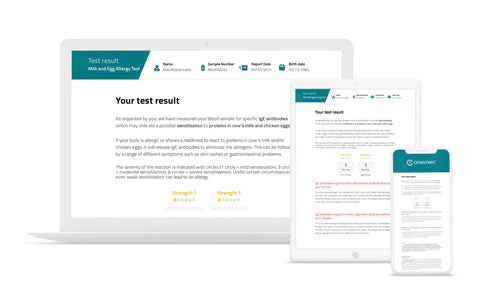
Result of the Dairy + Egg Allergy Test
As soon as your sample has been analysed, you will be able to view your individual results report in the My cerascreen® mobile app or by logging in on our website, where you can also print the report.
The laboratory analysis will tell you whether the number of IgE antibodies against chicken egg white and/or cow’s milk is elevated in your blood. Learn which foods to avoid if you have an allergy and how to get all the essential nutrients with our recommended actions. Read in-depth health information about food allergies and the difference between a milk allergy and lactose intolerance.
Frequently asked questions about Dairy + Egg Allergy Test
Why should I test for a milk or egg allergy?
Milk and eggs are among the foods that most frequently trigger allergies. Milk and egg allergies are especially common in children, but still occur in adulthood.
For those affected, this allergy can be very limiting. Milk is not only found in muesli, coffee, cheese or yogurt – as much as eggs are not only in fried or scrambled eggs. They are also used in numerous sauces, pastries and ready-made products.
Do you suspect that you might be sensitive to a certain food, but you can’t pinpoint the symptoms to specific meals and dishes? Then perhaps milk or egg are the culprits. An allergy test can give you a concrete indication of a food allergy.
How does the Milk and Egg Allergy Test work?
The Allergy Test is a self-test that you can easily do at home. The test kit comes with a lancet that you use to take a few drops of blood from your fingertip, which you then collect on the dried blood spot card provided. You then send the blood sample to a specialist laboratory, which analyses your blood for specific IgE antibodies.
Once the analysis is complete, you will be notified, and you will be able to access your personal results report in your My cerascreen online account.
Please note that the most meaningful results will only be obtained if you have had regular contact with the allergen in the two weeks or so prior to sampling. Some medications, for example antihistamines, can also influence the result.
What does the Milk and Egg Allergy Test tell me?
An allergy test will tell you if you are sensitised to chicken egg white or cow’s milk and how severe it is. Sensitisation means that your immune system produces more IgE antibodies against the allergens in the food.
Sensitisation does not automatically mean that you have an allergy. However, if you also experience allergy symptoms after eating eggs or milk, you can assume that you have an allergy.
What recommendations does the Milk and Egg Allergy Test give me?
If you have a milk or egg allergy, it is best not to eat the problematic foods at all. The many ready-made products in which milk and egg are processed do not make things easy for allergy sufferers. That is why you will be given some useful dietary tips with your results report.
Among other things, it is important to make sure you get enough calcium if you have a milk allergy. The mineral is important for bone health, and people in Europe and North America get a lot of it from milk and dairy products. Alternative sources of calcium include mineral water, broccoli and kale.
What happens if you have a milk or egg allergy?
Allergies always occur when the immune system overreacts – the defence cells react to harmless substances that we call allergens. These allergens are different proteins that are found in pollen, dust mites and foods such as milk and eggs.
In allergy sufferers, if the allergens from milk or eggs encounter the immune cells, they release the messenger substance histamine. The histamine causes inflammation of the mucous membranes and thus quickly leads to the typical symptoms of an allergy. Very small amounts of the allergen are often enough to cause this.
What are the causes of a milk or egg allergy?
How allergies develop has not yet been definitively clarified in detail. A genetic predisposition definitely plays a role. If both parents are allergic to certain foods or have related diseases such as neurodermatitis and asthma, it is more likely that their child will also develop an allergy.
Allergies to milk and egg usually develop in childhood. They often go away on their own during childhood and puberty. If they persist into adulthood, those affected often suffer from them for the rest of their lives.
What are the symptoms of a milk or egg allergy?
Like most food allergies, allergies to eggs and milk manifest themselves in similar ways. Typical symptoms are:
- Swelling and burning in the mouth
- Gastrointestinal symptoms such as nausea, vomiting, diarrhoea and abdominal pain
- Allergic rhinitis, cough, swelling of the larynx
- Skin rashes (hives) and itching
Chicken eggs and cow’s milk can also cause very severe allergic reactions, including life-threatening anaphylactic shock. In such an allergic shock, the blood pressure drops sharply. Heart palpitations, dizziness, shortness of breath and unconsciousness may occur.
How do I treat a milk or egg allergy?
TThere is no treatment that can cure allergies to milk and egg. Scientists are currently researching so-called immune therapies with which they hope to treat food allergies in the future – but right now, research has not yet advanced that far. In the short term, allergic symptoms can be treated with drugs such as antihistamines. However, these drugs only weaken symptoms.
Therefore, the best thing to do if you have a food allergy is to consistently avoid the foods you are allergic to. If you are allergic to eggs or milk, you should pay attention to packaging labels. Milk and eggs are often hidden in ready-made products, sauces and pastries, and sometimes only a glance at the ingredients list reveals this.
If you suffer from a very severe allergy that can lead to anaphylactic shocks, your doctor will probably prescribe you an anaphylaxis emergency kit. The kit contains, among other things, an adrenaline pen, which can be life-saving in the event of an anaphylactic shock.
For whom is the test not suitable?
The Allergy Test is not suitable for or is only suitable to a limited extent for certain groups of people:
- People with infectious diseases, such as hepatitis and HIV, are not allowed to take the Milk and Egg Allergy Test.
- People with haemophilia should not take the blood test.
- Pregnant and breastfeeding women should only take the Milk and Egg Allergy Test under medical supervision. The reference values and recommendations do not apply to them either, so they should receive recommendations on the test result from a doctor.
- The Milk and Allergy Test is not suitable for children under 18 years of age.
The test is not intended for diagnosing disease. For example, if you suffer from severe skin changes or chronic diarrhoea, seek medical advice.
Why are children under 18 not allowed to take the test?
Our tests are not suitable for underage children and adolescents under the age of 18. Under 18s cannot activate the tests online and therefore cannot receive a test result. We ask that you do not administer the tests to your children either.
Children and adolescents need much closer supervision and counselling regarding medical tests and their interpretation. Testing with lancets and chemicals is not without risk and would need to be closely supervised by guardians. In addition, the reference values we give are always based on adult data. In the case of children, the risk of misinterpreting the results would be very high.
We want to fulfil our responsibility as a provider of medical products and ensure that children and adolescents are not unsettled by measurement results that are difficult for them to interpret. Since we cannot control whether the minors' legal guardians actually consent to the test being carried out and supervise them, we exclude tests for under 18s altogether.
If you are under 18 and have purchased a test, please contact our customer support.
Why does it take up to a week for the sample to reach the lab?
Please bear in mind that your results will not be analyzed in the UK but in Germany. For that reason, it can take up to a week for the sample to arrive at the lab. This does not affect the stability of the samples, as the method we are using is optimized for long transports.
Initially, your sample is sent to our collection center in the UK. From there, it is shipped to our central sample sorting facility in Germany, which then distributes samples to our partner laboratories. Once your sample is analyzed there, you will receive a notification and can access your result online.
Please check your mailbox regularly. We will notify you as soon as your sample is sent, arrives, or is analyzed.
This is how it works
1. Test at home
Your test kit contains everything you need to draw a small sample of blood from your fingertip. Then send the sample back to us free of charge in the enclosed return envelope.
2. View results online
After the evaluation in the medical specialist laboratory, you will have online access to your personal result report.
3. Act
Your access to the test results and the evidence-based findings and tips to improve your health: the my cerascreen® user profile on our website or our app.
